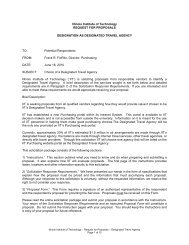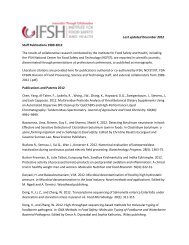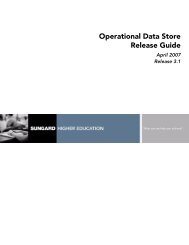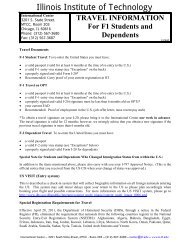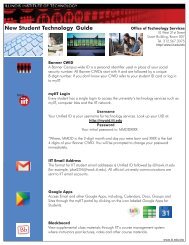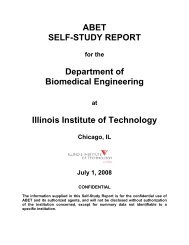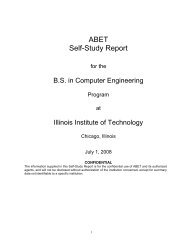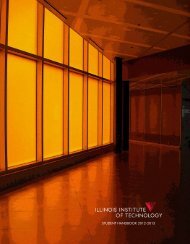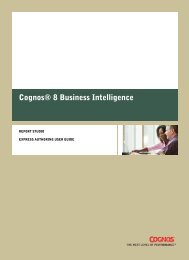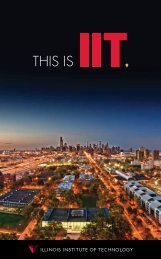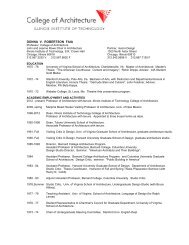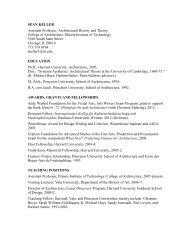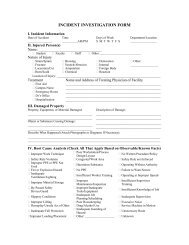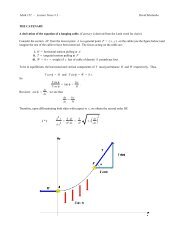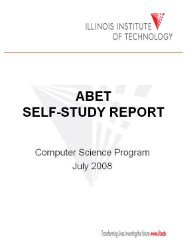Copyright & Disclaimer Information - Illinois Institute of Technology
Copyright & Disclaimer Information - Illinois Institute of Technology
Copyright & Disclaimer Information - Illinois Institute of Technology
Create successful ePaper yourself
Turn your PDF publications into a flip-book with our unique Google optimized e-Paper software.
Mathematics and Science Education<br />
Mathematics and Science Education<br />
Department Web site: www.iit.edu/departments/msed<br />
The Department <strong>of</strong> Mathematics and Science Education<br />
has an education program that prepares students for a<br />
teaching certificate at the secondary level while they<br />
receive a Bachelor <strong>of</strong> Science degree in biology, chemistry,<br />
physics, applied mathematics, computer sciences, or an<br />
engineering discipline.<br />
The department’s guiding principle is that those who can,<br />
do; those who understand, teach. That is, a math or science<br />
instructor must know the subject matter as well as<br />
how to teach it. The Department <strong>of</strong> Mathematics and<br />
Science Education is a discipline-based teaching program.<br />
Students will learn how to effectively teach their chosen<br />
disciplines because personal curriculum focuses on each<br />
student’s chosen discipline.<br />
The program draws primarily from constructivist epistemology<br />
as a means by which knowledge is developed and<br />
fully recognizes the individual perspectives from which<br />
learners approach school and life situations. Additionally,<br />
the knowledge base utilizes contemporary research on<br />
teaching and learning and is philosophically and substantively<br />
aligned with <strong>Illinois</strong> Content Standards and the<br />
pr<strong>of</strong>essional subject-matter organizations. Graduates <strong>of</strong><br />
the program will be leaders in instructional innovation in<br />
mathematics and science.<br />
The overall organizational framework for the program<br />
borrows heavily from Shulman’s (1986) Knowledge<br />
Specific Program Outcomes<br />
Program graduates will demonstrate their knowledge <strong>of</strong><br />
the stated domains <strong>of</strong> knowledge by<br />
• the development <strong>of</strong> integrated and in-depth<br />
subject matter knowledge in topical areas directly<br />
relevant to teaching content specialty (Subject<br />
Matter Knowledge);<br />
• the successful development <strong>of</strong> instructional<br />
materials/plans consistent with research on<br />
teaching/learning and supports emotional development<br />
(Pedagogical Knowledge);<br />
• successfully working within the school and community<br />
in a manner that fosters community and state<br />
instructional goals (Knowledge <strong>of</strong> Schools);<br />
• development and implementation <strong>of</strong> instructional<br />
materials and plans that are consistent with current<br />
cognitive and social theories on student learning and<br />
personal development for regular as well as special<br />
needs students (Knowledge <strong>of</strong> Learners);<br />
110 IIT Undergraduate Bulletin 2006–2008<br />
<strong>Copyright</strong> & <strong>Disclaimer</strong> <strong>Information</strong>: <strong>Copyright</strong> © 1994, 1995, 1996, 1997, 1998, 1999, 2000, 2001, 2002, 2003, 2004, 2005, 2006, 2007. CollegeSource®, Inc. and Career Guidance Foundation. CollegeSource® digital catalogs are derivative works owned and copyrighted by CollegeSource®, Inc. and Career Guidance Foundation. Catalog content is owned and copyrighted by the appropriate school. While CollegeSource®, Inc. and Career Guidance Foundation provides information as a service to the public, copyright is retained on all digital catalogs.<br />
<strong>Copyright</strong> & <strong>Disclaimer</strong> <strong>Information</strong>: <strong>Copyright</strong> © 1994, 1995, 1996, 1997, 1998, 1999, 2000, 2001, 2002, 2003, 2004, 2005, 2006, 2007. CollegeSource®, Inc. and Career Guidance Foundation. CollegeSource® digital catalogs are derivative works owned and copyrighted by CollegeSource®, Inc. and Career Guidance Foundation. Catalog content is owned and copyrighted by the appropriate school. While CollegeSource®, Inc. and Career Guidance Foundation provides information as a service to the public, copyright is retained on all digital catalogs.<br />
Growth in Teaching with the ultimate focus on the<br />
Teacher as Transformer <strong>of</strong> Subject Matter. At an operational<br />
level, the program focuses on the development,<br />
revision, and elaboration <strong>of</strong> six primary domains <strong>of</strong><br />
knowledge that both theory and research have indicated<br />
are essential for effective instruction. It is this combination<br />
<strong>of</strong> domains <strong>of</strong> knowledge that distinguishes the<br />
expert teacher from others possessing one or more <strong>of</strong><br />
the following domains <strong>of</strong> knowledge: subject matter<br />
knowledge, pedagogical knowledge, knowledge <strong>of</strong> schools,<br />
knowledge <strong>of</strong> learners, curricular knowledge, and pedagogical<br />
content knowledge.<br />
Within the Knowledge Growth in Teaching model, the<br />
IIT program is committed to providing students with<br />
experiences that help them develop a full range <strong>of</strong> knowledge<br />
and skills in the areas <strong>of</strong> subject matter, pedagogy,<br />
pedagogical content knowledge, schools, learners and curriculum<br />
within a framework <strong>of</strong> moral and ethical<br />
societal norms, including a commitment to equity and<br />
diversity. From a constructivist perspective, individuals<br />
are continually structuring knowledge and revising their<br />
structures <strong>of</strong> knowledge in response to differing contexts<br />
and new knowledge/perceptions. Consequently, it is<br />
important to note that the program does not view any <strong>of</strong><br />
the domains <strong>of</strong> knowledge as completed outcomes upon<br />
graduation. Rather, the domains provide a basis for continued<br />
life-long pr<strong>of</strong>essional development.<br />
• appropriate selection <strong>of</strong> instructional/curriculum<br />
materials relative to local, state, and national curriculum<br />
goals and reforms, and exhibited ability<br />
to analyze and revise materials so that they are<br />
consistent with appropriate curriculum goals<br />
(Curricular Knowledge); and<br />
• successful development and implementation <strong>of</strong><br />
instruction that represents current subject matter to<br />
students in a form that promotes in-depth understanding<br />
and ability to apply knowledge to new and<br />
unique situations (Pedagogical Content Knowledge).



